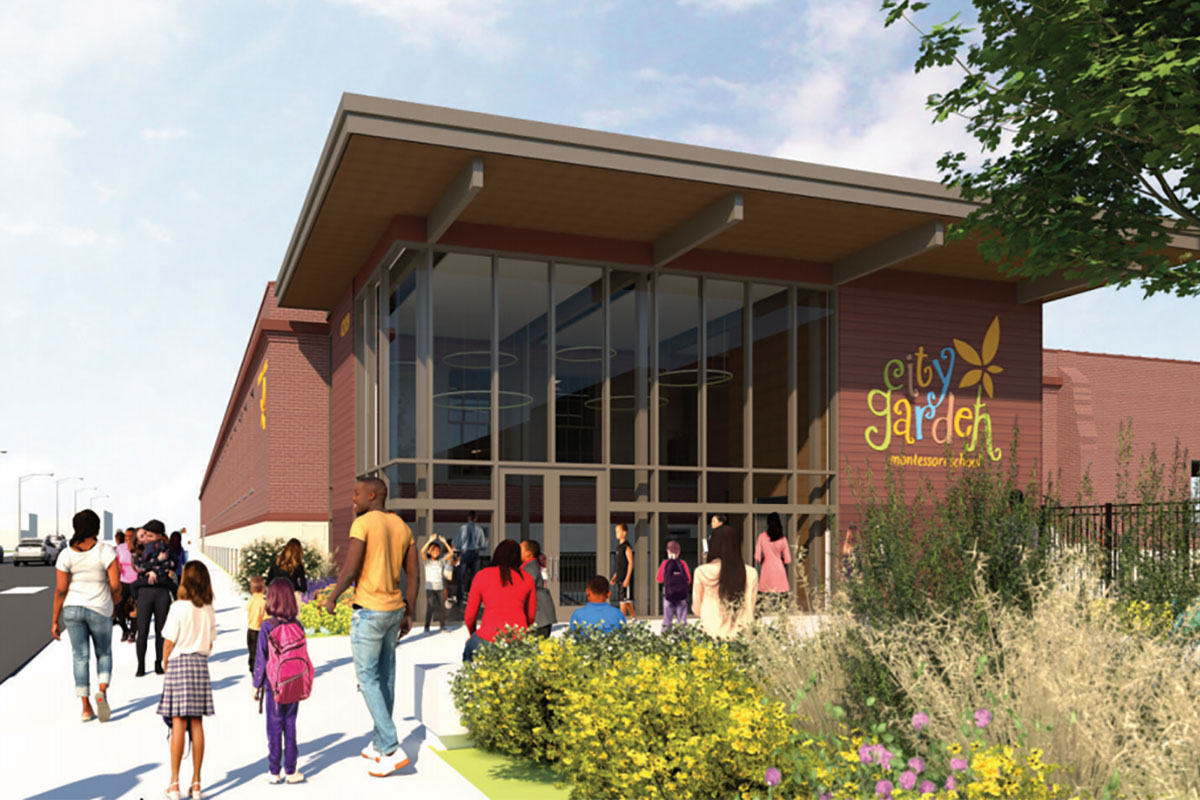City Garden Montessori has long been a bright spot in St. Louis’s education landscape due to its unique model, commitment to diversity, and higher than average student performance. The school’s dedication to its unique anti-bias, anti-racism (ABAR) Montessori teaching model has set it apart locally and nationally. After years of receiving twice as many applications as available seats, City Garden Montessori is building on its success by expanding their footprint while also doubling down on their commitment to equity.
Addressing community needs through strategic expansion
In 2018, City Garden Montessori launched a strategic planning process that engaged the voices and feedback of staff, families, and students and resulted in a plan to expand the school’s footprint to reach nearly 10% of all elementary school-aged children in St. Louis city. The Opportunity Trust has committed $2 million over five years to help bring this plan to life.
City Garden is on track to complete the construction of their new school building on Folsom Avenue, two blocks from the current school. The new school will house 1st-8th grade students starting in the 2021-2022 school year. The current school building on Tower Grove Avenue is undergoing updates to house its expanded early childhood program, which will increase kindergarten seats from 30 to 90 and preschool seats from 56 to 125 for the 2021-2022 school year. Demand for City Garden admissions is high and the school has fulfilled its goal of nearly tripling admissions.
“We are thrilled to open our doors to more families in St. Louis through this expansion,” said Christie Huck, CEO and Executive Director of City Garden Montessori School. “This has been in progress for years and we are excited to finally see the vision come to life as we better serve our community.” With expanded capacity, City Garden’s impact will dramatically grow from about 260 students to serving 2,400 students.
Continuing a bold commitment to equity
City Garden’s commitment to diversity is also at the forefront of its strategic expansion. Since the beginning of City Garden’s charter in 2008, the school has aimed to serve as a catalyst for racial and economic equity in St. Louis by being intentionally diverse and by centering a commitment to anti-bias, antiracism. The increased gentrification of the surrounding neighborhood has changed the demographics of the school’s catchment zone and threatened the school’s ability to fulfill this role. To combat this, City Garden leadership created a committee of staff, parents, and board members to review the school’s catchment areas and determine whether they will make future changes to meet diverse enrollment goals.
“The diversity at City Garden is part of what makes the school so successful and welcoming to community members,” says Kamau Whitfield. “As a City Garden parent, I felt compelled to make sure the school continues its commitment to diverse enrollment and is able to serve even more families in St. Louis.”
In partnership with IFF Research, City Garden leaders reviewed maps of St. Louis detailing the city’s gentrification and Black family displacement. This information now helps inform decisions around changing City Garden’s enrollment catchments to remain diverse. Changes to the enrollment structure for the 2021-2022 school year will help ensure the school meets its goal of enrolling 50% or more Free or Reduced Lunch eligible students in both kindergarten and preschool and at least 50% Students of Color.
City Garden also plans to open a Center for Equity to lead efforts around community organizing, policy advocacy, and coalition building in St. Louis. The center will serve as a community hub, as well as support efforts to increase access to public Montessori in Missouri, connect families to affordable housing, and empower parents advocating for educational equity.
To strengthen both training for City Garden’s staff and increase the reach of an ABAR Montessori model, the strategic plan also called to open the City Garden Montessori Institute. The Institute is designed for local and national teachers interested in learning the school’s unique teaching model and philosophy for public education. The two-year training program for upper and lower elementary educators is an intensive program to learn the ABAR Montessori model to be replicated and shared across St. Louis and the nation. The pilot cohort began in the summer of 2020 with five City Garden teachers, and the program is currently recruiting a second cohort.
Pivoting during the pandemic for community support
During the pandemic, City Garden has been a local leader in prioritizing equity in its COVID-19 response. During the shift to virtual learning, City Garden implemented a tiered system of availability to offer seats to students with the highest needs first.
In the fall of 2020, City Garden welcomed its new principal, Crystal Isom, who, throughout the summer, met one-on-one with parents to inform a system of hybrid learning to support individual family needs.
“After conversations with families we launched the ‘Fab Friday Enrichment” series, offering enrichment courses to students online and in-person, including music, cooking, art, African dance, and more,” said Crystal. “This kept students engaged in learning outside of their traditional classroom environment.”
Additionally, in partnership with Clemson University, interested students were able to participate in virtual STEM classes. Students received packets in the mail with interactive materials to use in class for hands-on learning at home.
City Garden provided financial support, tutoring resources, and priority for in-person learning seats for the students and families most in need, ensuring no learning was lost during remote education.
“As a community, the pandemic has invited us to lean deeper into our values and help our most vulnerable students and families thrive in these unprecedented hardships,” Christie said. City Garden will continue to focus on its most vulnerable students and families’ needs as the school grows its footprint and trains a new generation of certified ABAR Montessori teachers.
